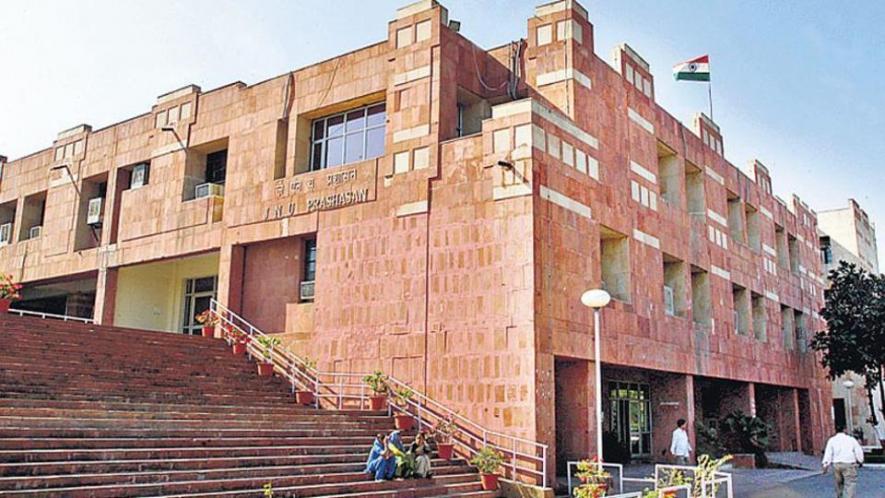Not Paid For 4 Months, Sanitation Workers in JNU Face Hunger and Uncertainty

File Photo
New Delhi: Anil (name changed) has been living in Munirka, South Delhi, for quite a good time now as it suits him best to walk and reach his workplace at Jawaharlal Nehru University in a few minutes. Sticking to strict guidelines issued by the government to prevent the spread of COVID-19, nowadays he visits his office only for emergency calls, such as cleaning choked drains.
Anil is among hundreds of sanitation workers engaged in the prestigious university who are waiting for their salaries since the past three months, leaving them cash-strapped at a time times when they need it the most.
JNU, through a number of independent firms, including Max Maintenance Limited and Bedi and Bedi Associates, engages around 170 sanitation workers who have been working tirelessly during the pandemic.
Narrating his ordeal to NewsClick, Anil said: “In the first month, they said the money will be released soon. I borrowed some money from my friend for my daily expenses. This was repeated in the second month too. I waited patiently. But things changed after the pandemic was announced. I am a father of three children and I need to feed them. I requested my landlord to delay the rent as I had no money to pay. Luckily, he too understood the situation. I earn around Rs 12,000/month and pay Rs 5,500 as rent. I was supported by my wife who worked as a domestic help in neighbouring Munirka Enclave. Now, her income too has stopped...the only relief I have received is through a ration kit from the Delhi government and some food items distributed by students of the university.”
But Mahinder (name changed) is not that lucky. He lives in Khanpur and needs to travel 10 kilometres, exposing him to the risk of infection. With no food security for his family, and an adamant landlord, the situation is getting difficult by the day. Talking to Newsclick over phone, he said: “My landlord is consistently after me to pay the rent. I requested him to delay but he is not budging. I had little savings, which has vanished now. Things have become so bad that now I am cycling to the university to save fuel cost.”
Critical of the police, Mahinder said: “We have lost a substantial share of our wages as we were stopped and harassed by the police when the lockdown was initially announced. Since we could not reach our workplace, we were marked absent by our supervisors. Thus, no money will be given for these days.”
The delay of salaries to sanitation workers appears to have become a norm in the university. In October last year, demanding timely wages and bonus on Diwali, sanitation workers had observed a successful strike. The university administration resorted to action and the agencies suspended the president of the sanitation workers union. The suspension was challenged in the court.
However, in this crisis, JNU students have come to the rescue of sanitation workers, providing them food items and other safety equipment through crowdfunding.
Lokendra Kumar, president of Students’ Federation of India’s JNU unit, told NewsClick: “We were receiving reports that sanitation workers were in distress. We collected some money from friends and other citizens and procured rations for them. So far, we have distributed 80 kits to these workers, but that is not enough. We will soon arrange some ration for the rest of the workers.”
On the issue of pending salaries to sanitation workers, Kumar said: “While the role of frontline workers amidst the global pandemic becomes even more significant, the administration and their companies' attitude towards them is inhuman. A lag in payment of salaries of more than three months amid the ongoing lockdown has turned their life chaotic.”
Seemingly unperturbed by the ordeal of sanitation workers, who have been referred to as ‘corona warriors’ by the Prime Minister, the JNU administration appears to have other priorities. The university, which claims to be facing a fund crunch, is organising a two-day webinar for students and faculty members to inculcate leadership skills through the well-known epic, Ramayana. Defending the workshop, the administration said the webinar was part of lecture series to help students and faculty members cope with coronavirus.
But, why did the university reach a situation where it has no money to pay to sanitation workers.
Sources allege that the root for the delay in salaries lies in mismanagement of funds by the university. “The university has an increased budget for security expenses as well as pays a massive fee to the National Testing Agency for conducting entrance examinations annually. The expense for the security has gone up by 250%. In 2018-19, the university spent Rs 9 crore more on security in comparison with 2016-17 and 2017-18. Similarly, it is still not known how much is being paid to National Testing Agency. Even members of the Executive Council do not have a clue about it,” said a source.
Get the latest reports & analysis with people's perspective on Protests, movements & deep analytical videos, discussions of the current affairs in your Telegram app. Subscribe to NewsClick's Telegram channel & get Real-Time updates on stories, as they get published on our website.
























